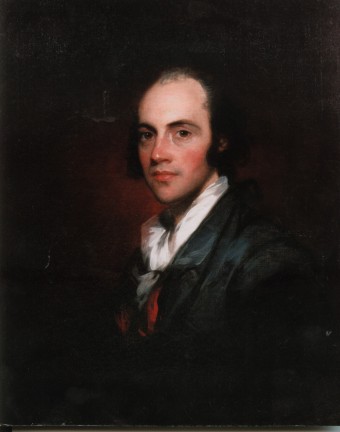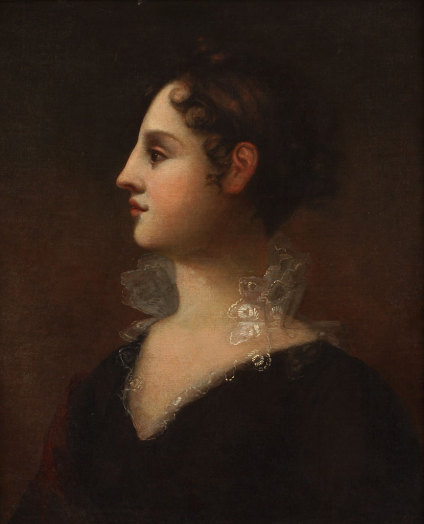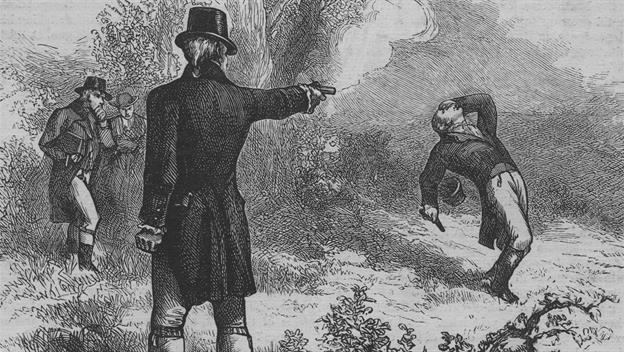
Aaron Burr is well known for shooting Alexander Hamilton, a longtime enemy of his. He was also the third Vice President, serving during Thomas Jefferson’s first term. Burr was a NY senator and the third New York State Attorney General.
On February 6, 1756 Aaron Burr Jr. was born in Newark, New Jersey. Burr was noted to have been a very sickly baby by his mother. His father, Aaron Burr, died September 24, 1757. Soon, Burr’s mother came in contact with smallpox and died a well. Burr and his sister, Sally, left to live with their Uncle Timothy Edwards. He did not get along well with his uncle, who was a ste puritan. Burr was even occasionally beat by his uncle.
Burr applied for Princeton at eleven. They did not accept him because he was too young. When Burr was thirteen, he applied again and was accepted. At sixteen, Burr graduated from Princeton. Burr went to study Theology, but quickly lost interest. Instead, he left for Litchfield, Connecticut to study law at Tapping Reeve.
When the revolutionary war broke out, Burr volunteered to accompany Colonel Benedict Arnold and his men up to Quebec. He became a captain on the headquarters’ staff when Benedict’s men joined General Montgomery. After an attack on Quebec and when Montgomery was found dead, Burr was sent to Montreal. This led to him being sent to Camp Sorrel then Fort Chambly. George Washington offered him a spot on his staff once Burr had returned to New York later that May. Burr accepted. He was later transferred to General Israel Putnam. General Putnam was in charge of lower Manhattan. In August, Burr was transferred To General McDougal in Brooklyn. He soon returned back to General Putnam and stayed with him until July of the next year. Burr became Lieutenant-Colonel while apart of Malcolm’s regiment.
That June in 1778, Burr led his men in the Battle Of Monmouth. Burr was left with slight sunstroke and took a short leave. The next year in January, Burr was transferred under General McDougal to Westchester County, New York. Burr’s health was increasingly getting worse and worse. He resigned in March. Burr did not cease to help the military, tough. He frequently communicated secret orders and dispatches.
Burr went back to study law. He soon came in contact with melancholia. For a while, Burr had been having an affair with Theodosia Prevost. When her husband, a British officer died, the two were married in July, 1782. Burr was twenty-six. Theodosia was ten years older than Burr and had already had five children. Before they were married, Burr had been admitted into the bar as a counsellor. In June, 1783, Burr’s daughter, Theodosia was born. Theodosia was named for her mother.
Six months later, Burr left Albany to New York City in November of 1783. By this time, England and America were at pace. English troops departed from the colonies. Burr was known for spending lavishly while he was in the city. His debts were always hit. But about six months more later, he was elected onto the State Assembly. Burr left the State Assembly after finishing up his second term. He became one of the leaders of the New York bar. He was known to have clashed often with Alexander Hamilton during this time. Unlike Hamilton, Burr was also known to think far ahead of his times, making him unpopular and misunderstood.
In 1789, Burr became Attorney General of New York, appointed by Governor Clinton. Two years later in 1791, Burr took the senate seat belonging to Philip Schuyler, who also happened to be Hamilton’s father-in-law. Hamilton never forgave Burr for this. It was the beginning of their long time rivalry. Burr also had a lot of conflict with Thomas Jefferson while working in the senate. When his wife fell ill, however, Burr wanted to resign from the senate, but she would not allow it. In 1794, she died. Burr was noted to have become much closer to his daughter Theodosia during this time.

Women generally did not receive the same education as men. Burr was determined to make a prodigy of his daughter though. It has been said that he is perhaps one of the first feminists in U.S. history because of his strong beliefs that women should receive the same education as men. Burr was extremely proud of Theodosia and how well educated she was.
Governor Clinton of New York offered Burr a seat on the State Supreme Court. Burr declined. In 1796 he did run for president though. Burr, however, only had thirteen electoral votes. Jefferson had sixty-eight and John Adams had seventy-one. So, Burr finished up his senate term then rejoined the New York State Assembly.
In 1800, Burr ran for president again. Votes were counted up across the country. It seemed that the country was for the Republicans. Hamilton was furious because both Republican leads were Burr and Jefferson. The two Federalist leads were Adams and Pinckney. When votes were counted, Jay had one, Pinckney had sixty-four, Adams had sixty-five, and both Jefferson and Burr were tied with seventy-three. Hamilton did all he could during this time to insure that Burr would not be elected president. The house began to ballot on February, 11, 1801. It took thirty-six ballots before Jefferson became president and Burr vice-president.
Two well known pamphleteers, Chatham and Duane, wrote many attacks on Burr after the election. Burr was soon charged with conspiracy with certain Federalists against Thomas Jefferson. Hamilton continued to show his hate and distrust towards Burr and Jefferson, but Burr especially. Burr realized that if he had done what Jefferson did and bargained more, he may have actually became president. And as Jefferson wrote and had attacks written on Burr, Burr did not do the same to him.
On the second of February, Theodosia was married to future Governor of South Carolina, Joseph Alston of Charleston. On May 29, 1802, a year after their marriage, their son Aaron Burr Alston was born.
Burr did not take on his role as vice president until 1802 on January fifteenth. Jefferson purposely ignored Burr and gave important posts in New York to Burr’s enemies. Soon, Burr was charged with going over to the Federalists. For two years to come, pamphleteers continued to write attacks on Burr. A republican caucus was held in Washington in February of 1804. The caucus voted Jefferson for president and Governor George Clinton for vice president. Burr was encouraged to run as the new governor for New York, but he was defeated greatly. From there, Burr took a step away from politics.

Hamilton would still not cease to write attacks and lies on Burr, so Burr wrote to him. He asked Hamilton to a duel on July 11, 1804 that would be held in New Jersey. Burr ended up shooting Hamilton, who died the next day. From there, Burr realized he would forever be known as the man who shot Hamilton. His reputation was ruined. Sure enough, when people found out about the news, everyone went for him, including the Federalist party. Burr was never sent to trial for killing Hamilton though. In 1807 Burr was brought to court, but not for killing Hamilton. It was for conspiracy and high misdemeanor. His supposed crimes involved leading the military onto territory belonging to Spare and trying to split up territories belonging to the U.S. This only made Burr look worse in the eyes of the public.
Burr left the country for four years, traveling across Europe. He later returned in 1812. His daughter died shortly on January, 1813 in a shipwreck. In 1833, Burr married Eliza Jumel. He was over seventy years old. They soon divorced, leading to many strokes. Burr died September 14, 1836 on Staten Island, New York.